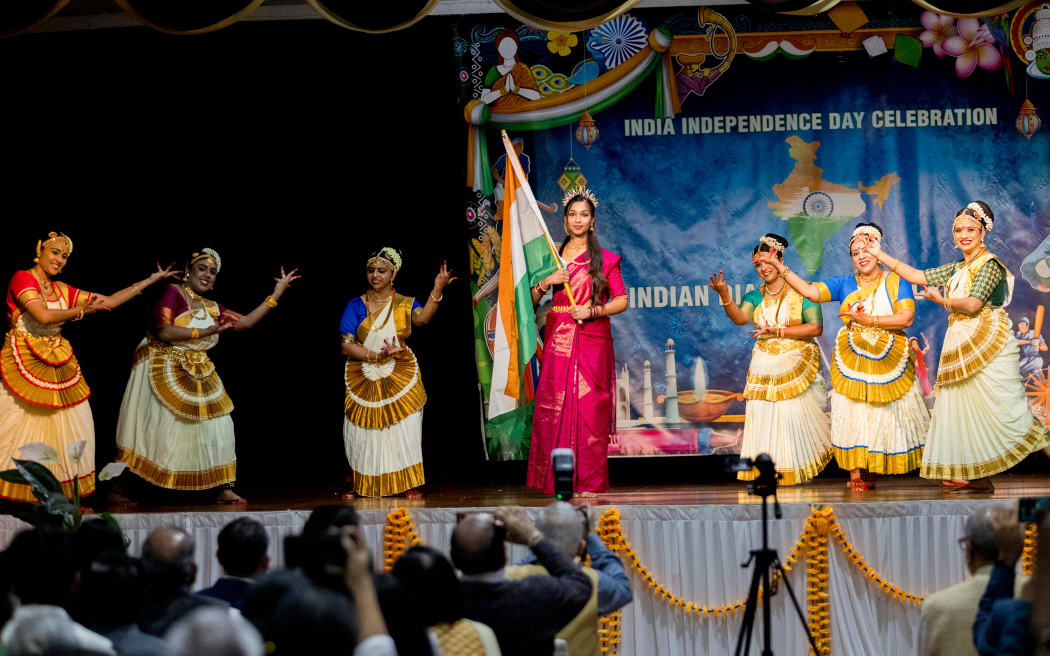Lifestyle
Māori-Indian Celebrations Mark India’s Independence Day in New Zealand

New Zealand’s Indian community celebrated India’s Independence Day with a vibrant display of culture and collaboration over the weekend. From August 15 to August 17, cities like Auckland, Hamilton, Wellington, Dunedin, and Palmerston North hosted events that highlighted the rich heritage of India and the growing relationship between Māori and Indian cultures.
Auckland, home to the largest Indian diaspora in New Zealand, was the focal point of the celebrations. The festivities included a MasterChef competition featuring Māori and Indian chefs, as well as fashion showcases from both cultures. The Mahatma Gandhi Centre in Eden Terrace served as a gathering place for Indian diaspora organizations to come together and honor their diverse backgrounds.
On August 16, Prime Minister Christopher Luxon and opposition leader Chris Hipkins joined the celebrations at the Dew Drop Events Centre in Auckland. Their unexpected performances during a popular Indian dance number captivated attendees. The following day, representatives from over 15 Indian states delighted the crowd with traditional dances at Mount Eden, reflecting the unity and diversity of India.
The significance of the celebrations was underscored on August 15, marking the anniversary of India’s independence from British rule in 1947. The Indian High Commission in Wellington and the Consulate General in Auckland hosted a joint reception to commemorate the occasion. Among the attendees was Nikhil Ravishankar, the incoming Indian-origin chief executive of Air New Zealand, whose appointment was praised by Ethnic Communities Minister Mark Mitchell as a sign of the positive contributions from the Indian community.
Speakers throughout the weekend, including High Commissioner Neeta Bhushan, Consul General Madan Mohan Sethi, and various community leaders, emphasized the importance of friendship and collaboration between cultures. The Indian community has grown significantly, with the 2023 Census reporting that 292,092 individuals identified as having Indian heritage, a 22 percent increase since 2018. This community is now the third largest in New Zealand, surpassing the Chinese population.
The economic impact of the Indian community is noteworthy, contributing an estimated $10 billion to New Zealand’s economy in 2019, according to a report by Sense Partners. This figure represented roughly 3.3 percent of the total GDP at that time and is believed to have grown in recent years. Furthermore, the median personal income for Indian adults reached $51,600 in 2024, surpassing the national average of $41,500.
Cultural performances played a significant role in the celebrations. In Palmerston North, community groups united for an event titled “United in Diversity,” while the Dunedin Indian Association organized a grand patriotic event featuring South Indian classical music at the University of Otago. Auckland’s festivities included performances by renowned Indian pop singer Shibani Kashyap, supported by local cultural organizations.
One of the standout events was the collaboration between the Whiria Collective and India’s CD Foundation, which curated a cross-cultural fashion show and MasterChef competition. Māori chefs Sam Linstrom, Hera Te Kurapa, and Ihirei Walker faced off against Indian chefs Satyanarayana Pandari, Anuj Mathur, Suprabhat Banerjee, and Prem Ram. They created innovative dishes that combined Indian spices with New Zealand ingredients, showcasing the culinary potential of their cultures.
Anand Erickson, a lecturer at Auckland University of Technology and a judge for the competition, expressed enthusiasm for the fusion of culinary traditions. “This – fusion food and molecular gastronomy – is quite contemporary and trending,” he noted, encouraging future culinary collaborations.
The cultural presentations throughout the weekend were highlighted by an award-winning dance group from the Indian state of Telangana, which performed traditional dances such as Perini Natyam, Oggu Katha, and Dappu. Dancer Ravi Kumar explained that their performances narrate stories related to the Hindu God Shiva, a prominent figure in Telangana culture.
Local talent also shone through, with community members emphasizing the importance of these celebrations in preserving Indian heritage for younger generations. Mary Shaji, who performed the classical Indian dance Mohiniyattam, stressed that observing these festivals helps maintain a connection to their Indian roots and values.
As New Zealand’s Indian community continues to grow and thrive, these Independence Day celebrations served not only as a reflection of cultural pride but also as a testament to the collaborative spirit that defines the relationship between Māori and Indian cultures in the country.
-

 World4 months ago
World4 months agoTest Your Knowledge: Take the Herald’s Afternoon Quiz Today
-

 Sports4 months ago
Sports4 months agoPM Faces Backlash from Fans During Netball Trophy Ceremony
-

 Lifestyle4 months ago
Lifestyle4 months agoDunedin Designers Win Top Award at Hokonui Fashion Event
-

 Entertainment4 months ago
Entertainment4 months agoExperience the Excitement of ‘Chief of War’ in Oʻahu
-

 Sports4 months ago
Sports4 months agoLiam Lawson Launches New Era for Racing Bulls with Strong Start
-

 World5 months ago
World5 months agoCoalition Forms to Preserve Māori Wards in Hawke’s Bay
-

 Health4 months ago
Health4 months agoWalking Faster Offers Major Health Benefits for Older Adults
-

 Lifestyle4 months ago
Lifestyle4 months agoDisney Fan Reveals Dress Code Tips for Park Visitors
-

 Politics4 months ago
Politics4 months agoScots Rally with Humor and Music to Protest Trump’s Visit
-

 Top Stories5 months ago
Top Stories5 months agoUK and India Finalize Trade Deal to Boost Economic Ties
-

 Health2 months ago
Health2 months agoRadio Host Jay-Jay Feeney’s Partner Secures Visa to Stay in NZ
-

 World5 months ago
World5 months agoHuntly Begins Water Pipe Flushing to Resolve Brown Water Issue









